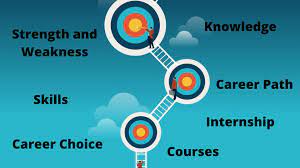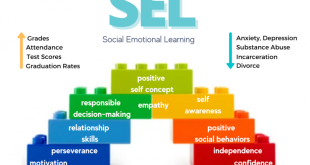Choosing the right educational path for your career is a significant decision that can influence your professional trajectory, job satisfaction, and overall life fulfillment. With the vast array of options available—ranging from traditional four-year degrees to vocational training and online courses—navigating this landscape can feel overwhelming. This article provides a comprehensive guide to help you make an informed decision about your educational journey.
 1. Self-Assessment: Understanding Your Interests and Goals
1. Self-Assessment: Understanding Your Interests and Goals
The first step in choosing the right educational path is self-assessment. Understanding your interests, strengths, and career goals is crucial in determining which educational route aligns with your aspirations.
Identify Your Interests
- Passions and Hobbies: Reflect on what you enjoy doing in your free time. Are there subjects or activities that excite you? Your interests can provide clues about potential career paths.
- Skills and Strengths: Consider your skills—both technical and soft skills. Are you more analytical, creative, or hands-on? Recognizing your strengths can help you choose a field where you can excel.
Set Career Goals
- Short-Term vs. Long-Term: Define your short-term and long-term career goals. Do you aim for a specific job title, or are you more focused on gaining experience in a particular field?
- Income Expectations: Consider your financial goals. Research the earning potential in various fields to understand how different educational paths may impact your future earnings.
2. Research Career Options
Once you have a clearer understanding of your interests and goals, the next step is to research potential career options. This phase involves exploring various fields and the educational requirements associated with them.
Explore Different Fields
- Job Shadowing and Internships: Gain firsthand experience by shadowing professionals in fields of interest or completing internships. This exposure can provide valuable insights into daily responsibilities and workplace culture.
- Informational Interviews: Reach out to individuals who work in your desired field to conduct informational interviews. Ask about their educational backgrounds, career paths, and advice for newcomers.
Understand Educational Requirements
- Degrees and Certifications: Research the educational requirements for your desired career. Some professions may require a bachelor’s or master’s degree, while others may only need a certification or diploma.
- Accreditation: Ensure that the educational institutions you consider are accredited. Accreditation ensures that the program meets specific quality standards and can affect job prospects.
3. Evaluate Different Educational Pathways
With a list of potential careers and their educational requirements, it’s time to evaluate the various educational pathways available to you.
Traditional University Degrees
- Bachelor’s Degree: A four-year degree is often required for many professional careers, such as engineering, healthcare, and education. Consider whether you are willing to commit to a four-year program.
- Master’s Degree: For advanced positions or specialized fields, a master’s degree may be necessary. Research the programs that align with your career goals.
Vocational and Technical Training
- Trade Schools: Vocational training can provide you with practical skills in fields such as plumbing, electrical work, or culinary arts. These programs are often shorter in duration and can lead to high-demand jobs.
- Certifications: Many industries, such as IT and healthcare, offer certification programs that can enhance your employability and demonstrate expertise.
Online and Flexible Learning
- Online Courses: Online education platforms like Coursera, edX, and Udacity offer courses from reputable institutions. This option provides flexibility for those balancing work and education.
- Hybrid Programs: Some institutions offer hybrid programs that combine online and in-person learning. This flexibility can be beneficial for individuals with other commitments.
4. Consider Financial Implications
Financing your education is a critical aspect of selecting the right path. Understanding the costs involved and exploring financial aid options can make a significant difference.
Analyze Tuition Costs
- Cost of Attendance: Research the tuition and fees associated with different programs. Consider additional costs, such as textbooks, supplies, and transportation.
- Return on Investment: Evaluate the potential return on investment (ROI) for your chosen field. Will the earning potential justify the cost of education?
Explore Financial Aid Options
- Scholarships and Grants: Look for scholarships and grants that you may qualify for, as they can significantly reduce your financial burden.
- Student Loans: If necessary, explore student loan options, keeping in mind the terms and interest rates. Understand the implications of debt on your future finances.
5. Seek Guidance and Support
Navigating educational choices can be overwhelming, but seeking guidance can help clarify your options.
Academic Advisors and Career Counselors
- Utilize Resources: Many educational institutions offer academic advising and career counseling services. These professionals can provide insights and resources tailored to your situation.
- Workshops and Seminars: Attend workshops or seminars on career planning and educational pathways. These can offer valuable information and networking opportunities.
Family and Friends
- Discuss Your Plans: Share your goals and options with family and friends. They can provide support, encouragement, and different perspectives based on their experiences.
6. Make a Decision and Set a Plan
After thorough research and consideration, it’s time to make a decision. Choose the educational path that aligns best with your interests, goals, and circumstances.
Create a Roadmap
- Set Milestones: Break down your educational journey into manageable milestones. Set specific goals for each stage, such as completing applications, enrolling in courses, or obtaining certifications.
- Stay Flexible: While it’s essential to have a plan, remain open to adjustments along the way. Career paths can evolve, and new opportunities may arise.
 Conclusion
Conclusion
Choosing the right educational path for your career is a crucial decision that requires careful thought and planning. By conducting a self-assessment, researching career options, evaluating educational pathways, considering financial implications, seeking guidance, and setting a clear plan, you can make informed choices that align with your aspirations.
Remember, your educational journey is not solely about obtaining a degree but also about cultivating skills, gaining experiences, and discovering your passions. Embrace the process, stay curious, and remain committed to lifelong learning as you navigate your career path. With the right education and mindset, you can achieve your goals and find fulfillment in your professional life.


